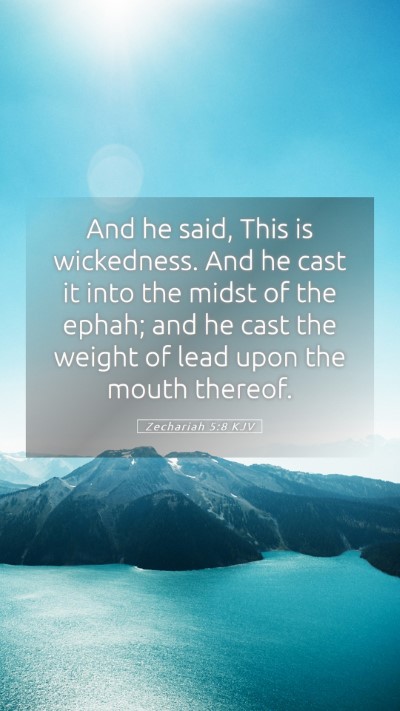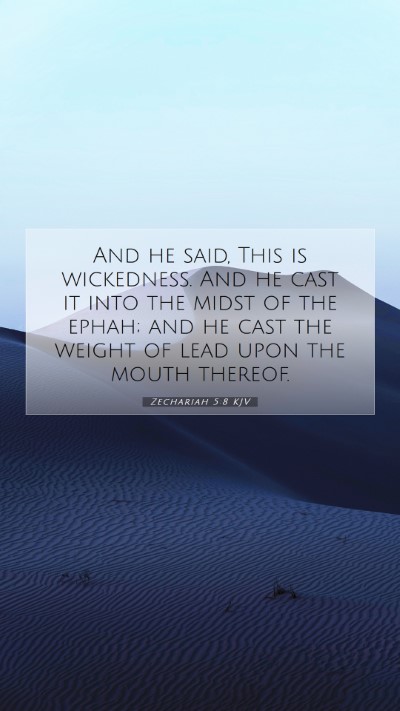Old Testament
Genesis Exodus Leviticus Numbers Deuteronomy Joshua Judges Ruth 1 Samuel 2 Samuel 1 Kings 2 Kings 1 Chronicles 2 Chronicles Ezra Nehemiah Esther Job Psalms Proverbs Ecclesiastes Song of Solomon Isaiah Jeremiah Lamentations Ezekiel Daniel Hosea Joel Amos Obadiah Jonah Micah Nahum Habakkuk Zephaniah Haggai Zechariah MalachiZechariah 5:8 Meaning
What is the meaning of Zechariah 5:8?
And he said, This is wickedness. And he cast it into the midst of the ephah; and he cast the weight of lead upon the mouth thereof.
Zechariah 5:8 Bible Verse Meaning
Understanding Zechariah 5:8
In this passage, Zechariah 5:8, we encounter a significant vision that form part of the prophet Zechariah's revelations concerning judgment and the purification of God's people. Below, we provide a comprehensive exploration of the verse combined with insights from public domain commentaries such as Matthew Henry, Albert Barnes, and Adam Clarke. This serves as a vital resource for anyone seeking Bible verse meanings, Bible verse interpretations, and Bible study insights.
Verse Context
The verse reads: "And he said, This is wickedness. And he cast it into the midst of the ephah. And he cast the weight of lead upon the mouth thereof." In the broader context of Zechariah's prophecies, this vision symbolizes a deeper spiritual message about sin and its consequences.
Commentary Insights
-
Matthew Henry's Commentary:
Henry emphasizes that the woman in the ephah represents wickedness. This imagery illustrates how sin is contained and eventually weighed down by God's judgment. Henry notes this vision serves as a stark warning about the nature of sin and its ultimate destiny.
-
Albert Barnes' Commentary:
Barnes affirms that the ephah is a standard measure, symbolizing the standard that God uses to judge the people. The lead weight signifies God's definitive and heavy judgment upon wickedness. His interpretation urges believers to recognize and address sin rigorously before it manifests in their lives.
-
Adam Clarke's Commentary:
Clarke points out that the act of casting the lead upon the ephah signifies God's restraining power over sin. He insists that, while the vision portrays judgment, it also underscores the grace available to repent and seek righteousness. Clarke suggests that understanding the judgment of sin is crucial for our Bible study lessons.
Meanings and Interpretations
From a combined perspective, Zechariah 5:8 encapsulates key themes of Biblical exegesis:
-
Wickedness Personified:
The woman represents not just individual sin but the broader societal corruption that must be confronted.
-
Measurement of Judgment:
The use of the ephah symbolizes that God's standards are just and righteous, conveying the idea that all actions are measured precisely.
-
The Weight of Judgment:
The heavy lead serves as a metaphor for inevitable consequences of wickedness; God’s intention is to remove such corruption completely.
Application to Daily Life
Understanding this verse enables believers to reflect on their own lives and the nature of sin. Key applications include:
- Recognizing the presence of wickedness within and around us.
- Understanding God's judgment as a call to repentance and change.
- Emphasizing the importance of living in accordance with God’s standards.
Related Bible Cross References
This verse connects meaningfully with other scriptural passages that deal with similar themes of judgment and wickedness:
- Isaiah 1:13-15: God's disdain for wicked sacrifices.
- Ezekiel 18:30: A call to repentance from all wrongdoing.
- James 4:17: Knowing to do good and choosing otherwise.
Conclusion
Zechariah 5:8 serves as a critical reminder of the nature of sin and judgment within the framework of God's redemptive plan. Through the insights of classic commentators, we gain a richer understanding of this verse's implications for our lives today. Engaging in Bible study groups or online Bible study sessions can further enhance our grasp of such pivotal scripture, allowing us to transform knowledge into action.


